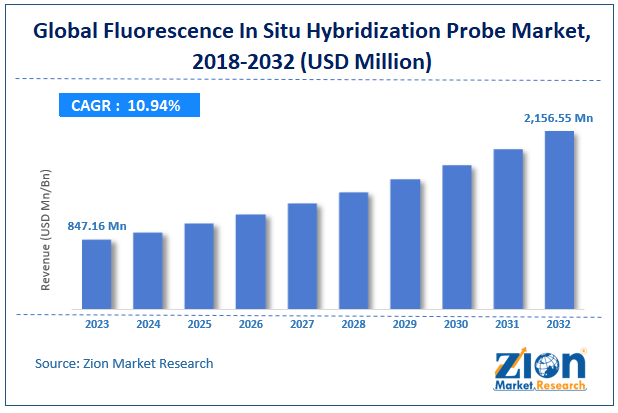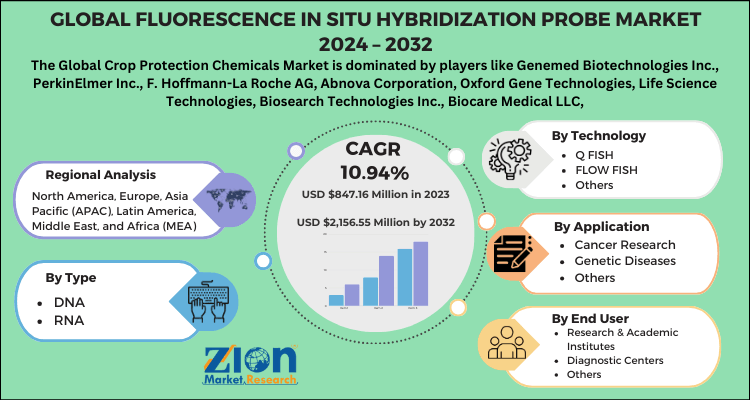Fluorescence In Situ Hybridization Probe Market Size, Share, And Forecasts 2032

Fluorescence In Situ Hybridization Probe Market By Type (DNA, And RNA [MRNA, MiRNA, And Other]), By Technology (Q FISH, FLOW FISH, And Others), By Application (Cancer Research (Lung, Breast, Bladder, Blood, Prostrate, Cervical, Others), Genetic Diseases, And Others), By End User (Research & Academic Institutes, Diagnostic Centers, And Others), And By Region - Global And Regional Industry Overview, Market Intelligence, Comprehensive Analysis, Historical Data, And Forecasts 2024-2032
| Market Size in 2023 | Market Forecast in 2032 | Growth Rate (in %) | Base Year |
|---|---|---|---|
| USD 847.16 Million | USD 2,156.55 million | CAGR at 10.94%. | 2023 |
Fluorescence In Situ Hybridization Probe Market: Size
The global fluorescence in situ hybridization probe market size was worth around USD 847.16 million in 2023 and is predicted to grow to around USD 2,156.55 million by 2032 with a compound annual growth rate (CAGR) of roughly 10.94% between 2024 and 2032.
The report covers forecast and analysis for the global fluorescence in situ hybridization probe market. The study provides historic data from 2018 to 2022 along with forecast from 2024 to 2032 based on revenue (USD Million).
Fluorescence In Situ Hybridization Probe Market: Overview
Fluorescent in situ hybridization (FISH) is used in a molecular cytogenetic technique that uses fluorescent probes in order to visualize and map individual’s genetic material. This technique is used to identify the fluorescent probes that are bound to the chromosome. FISH technique has wide range of applications in diagnostics industry like characterization of marker chromosomes, identification of numerical and structural abnormalities in the chromosomes, therapeutic drug monitoring, and rare genetic disease identification. The technique has various applications in clinical research that includes characterization of somatic cell hybrids and gene mapping.
In-depth secondary research is used to ascertain overall market size, top industry players, top product, industry associations, etc. Macro-economic indicators such as healthcare industry outlook, healthcare spending, research funding, GDP along with company websites, company annual reports, white papers, financial reports and other saws have also been considered to arrive at the indicated market numbers.
Fluorescence In Situ Hybridization Probe Market: Growth Drivers
The study also includes drivers and restraints for the fluorescence in situ hybridization probe along with the impact they have on the demand over the forecast period. Besides, the report includes the study of opportunities and trends available in the fluorescence in situ hybridization probe market on global level. Growing disease prevalence rate that has cytogenetic base like cancer, genetic abnormalities along with the demand for sensitive, rapid, and accurate prognosis techniques for validation of diseases are some of the factor market growth. Besides, pipeline products awaiting regulatory approval, and rising R&D activities by various market players for the development of new disease-specific biomarkers are further attributing market growth of FISH probes. Moreover, growing awareness along with rising healthcare expenditure and development of new and advanced probes are likely to drive the market growth globally.
Fluorescence In Situ Hybridization Probe Market: Segmentation
The study provides a decisive view on the fluorescence in situ hybridization probe market by segmenting the market based on type, technology, application, end user, and regions. All the segments have been analyzed based on present and future trends and the market is estimated from 2024 to 2032.
On the basis of type, the fluorescence in situ hybridization probe market is segmented into DNA, and RNA. RNA segment is further divided into mRNA, miRNA, and other. The mRNA segment held major share of the market in 2023 due to rising demand for molecular profiling by the healthcare professionals. Besides, technically advanced molecular pathology tools which help in the stratification for appropriate treatment are further contributing in the growing demand.
Based on technology the market is segmented into Q FISH, FLOW FISH, and others. Q FISH technique is likely to grow at high CAGR in the forecast period as these are commonly used to study instabilities in genome and offer various advantages like high specificity and affinity for telomeric repeats which contributes in the market growth of this segment.
Based on application the market is bifurcated into cancer research, genetic diseases, and others. Cancer Research market is further bifurcated into lung, breast, bladder, blood, prostrate, cervical, others. Cancer research segmented held major share of the market in 2023. Growing cancer prevalence across the globe and demand for rapid, sensitive, and accurate molecular diagnostic tests are some of the factors responsible for market growth of this segment. Besides, FISH probes are widely used in cancer diagnostics for detection of lung, and breast cancer.
Based on end user, the market is bifurcated into research & academic institutes, diagnostic centers, and others. Diagnostic centers are likely to grow at high CAGR in the forecast period.
Fluorescence In Situ Hybridization Probe Market : Report Scope
| Report Attributes | Report Details |
|---|---|
| Report Name | Fluorescence In Situ Hybridization Probe Market Research Report |
| Market Size in 2023 | USD 847.16 Million |
| Market Forecast in 2032 | USD 2,156.55 million |
| Growth Rate | CAGR of 10.94%. |
| Number of Pages | 130 |
| Key Companies Covered | Genemed Biotechnologies Inc., PerkinElmer Inc., F. Hoffmann-La Roche AG, Abnova Corporation, Oxford Gene Technologies, Life Science Technologies, Biosearch Technologies Inc., Biocare Medical LLC, Abbott Laboratories, Agilent Technologies. |
| Segments Covered | By Type , By Technology, By Application, By End User, and By Region |
| Regions Covered | North America, Europe, Asia Pacific (APAC), Latin America, Middle East, and Africa (MEA) |
| Base Year | 2023 |
| Historical Year | 2018 - 2022 |
| Forecast Year | 2024 - 2032 |
| Customization Scope | Avail customized purchase options to meet your exact research needs. Request For Customization |
Fluorescence In Situ Hybridization Probe Market: Regional Analysis
The regional segmentation includes the current and forecast demand for North America, Europe, Asia Pacific, Latin America, and Middle East & Africa with its further bifurcation into major countries. North America held major share of the market in 2023 due to high adoption rate of advanc0ed diagnostic techniques along with growing burden of cancer and infectious diseases. With rising prevalence of breast cancer and birth defects and genetic disorders the adoption rate of FISH probes in the diagnosis has boosted the market growth in this region.
Fluorescence In Situ Hybridization Probe Market: Key Players Analysis
The report also provides company market share analysis in order to give a broader view of the key players in the market. Industry insights and information is delivered in the required format. ZMR develops a list of industry players (manufacturers), distributors, retailers and industry experts. Some of the players in the market for fluorescence in situ hybridization probe include:
- Genemed Biotechnologies Inc.
- PerkinElmer Inc.
- F. Hoffmann-La Roche AG
- Abnova Corporation
- Oxford Gene Technologies
- Life Science Technologies
- Biosearch Technologies Inc.
- Biocare Medical LLC
- Abbott Laboratories
- Agilent Technologies
This report segments the global fluorescence in situ hybridization probe market as follows:
Global Fluorescence In Situ Hybridization Probe Market: Type Segment Analysis
- DNA
- RNA
- mRNA
- miRNA
- Other
Global Fluorescence In Situ Hybridization Probe Market: Technology Segment Analysis
- Q FISH
- FLOW FISH
- Others
Global Fluorescence In Situ Hybridization Probe Market: Application Segment Analysis
- Cancer Research
- Lung
- Breast
- Bladder
- Blood
- Prostrate
- Cervical
- Others
- Genetic Diseases
- Others
Global Fluorescence In Situ Hybridization Probe Market: End User Segment Analysis
- Research & Academic Institutes
- Diagnostic Centers
- Others
Global Fluorescence In Situ Hybridization Probe Market: Regional Segment Analysis
-
- U.S.
- Europe
- UK
- France
- Germany
- Asia Pacific
- China
- Japan
- India
- Latin America
- Brazil
- Middle East and Africa
Table Of Content
Methodology
FrequentlyAsked Questions
Fluorescent in situ hybridization (FISH) is used in a molecular cytogenetic technique that uses fluorescent probes in order to visualize and map individual’s genetic material.
According to study, the global Fluorescence In Situ Hybridization Probe Market size was worth around USD 847.16 million in 2023 and is predicted to grow to around USD 2,156.55 million by 2032.
What will be the CAGR value of the Fluorescence In Situ Hybridization Probe Market during 2024-2032?
The CAGR value of Fluorescence In Situ Hybridization Probe Market is expected to be around 10.94% during 2024-2032.
North America has been leading the global Fluorescence In Situ Hybridization Probe Market and is anticipated to continue on the dominant position in the years to come.
The global Fluorescence In Situ Hybridization Probe Market is led by players like Biocare Medical LLC, PerkinElmer Inc., F. Hoffmann-La Roche AG, Life Science Technologies, Abnova Corporation, Abbott Laboratories, Oxford Gene Technologies, Genemed Biotechnologies Inc., Biosearch Technologies Inc., and Agilent Technologies.
RelatedNews
HappyClients
Zion Market Research
Tel: +1 (302) 444-0166
USA/Canada Toll Free No.+1 (855) 465-4651
3rd Floor,
Mrunal Paradise, Opp Maharaja Hotel,
Pimple Gurav, Pune 411061,
Maharashtra, India
Phone No +91 7768 006 007, +91 7768 006 008
US OFFICE NO +1 (302) 444-0166
US/CAN TOLL FREE +1 (855) 465-4651
Email: sales@zionmarketresearch.com
We have secured system to process your transaction.
Our support available to help you 24 hours a day, five days a week.
Monday - Friday: 9AM - 6PM
Saturday - Sunday: Closed






